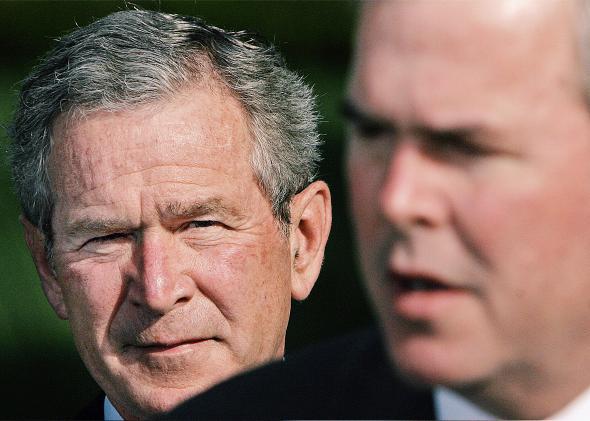Have you heard that Jeb Bush’s brother is George W. Bush? Of the Connecticut Bushes? It seems almost as if Jeb himself discovered this in the past week and just has to tell everyone about it. His brother was president—same gig he wants! Small world, eh?
Bush’s recent crowing about his older brother began during last week’s debate. Donald Trump was heckling him about how the most recent President Bush ruined the Middle East and the global economy. Jeb, who was instructed by his advisers to debate aggressively, turned to Trump and said, “You know what? As it relates to my brother, there’s one thing I know for sure. He kept us safe.” The rebuke was Bush’s strongest applause line of the night.
Bush has been yakking nonstop about his swell brother ever since. The day after the debate, Bush’s team took to Twitter to reaffirm his questionable assertion that President Bush, pictured standing atop a smoldering pile of rubble and bodies, “kept us safe.” At a Republican conference in Michigan last Friday, Bush appealed to his family name again, this time to explain how he would solidify various international partnerships. “I know how to do this because, yes, I am a Bush,” he said. “I happened to see two really good presidents develop relationships with other countries.” (That’s the other thing—did you know that his father was also president? The coinkydinks just keep piling up.) Over the weekend, his campaign went after a Democratic group for criticizing his brother’s record.
Ever since he began considering a run late last year, Bush had mostly dealt with questions about his brother by nervously tugging his collar and skedaddling. He was unable to support his oft-repeated message that he was his “own man” with any clear examples of policy daylight between himself and the 43rd president. Questions about his brother’s legacy and why the country should install a third Bush in the Oval Office were among the most predictable campaign issues in world history, and Bush for months was unable to devise a compelling or even coherent response to them.
The “pivot to embracing his brother,” as awful consultants would put it, turns out to be the latest byproduct of what we’ll generously call the Bush campaign’s spontaneous nature. The official story, as told to the Washington Post, is that Jeb Bush was thinking of something to say to Trump and just blurted out, “He kept us safe.” According to the Post, that rejoinder “refocused a campaign in desperate need of a moment.”
Well, who’s to say? It’s possible that Bush’s advisers really were energized by his response; it’s also possible that they all gasped when he said it and are now furiously spinning the press into believing they approved. Whatever the case, they’re running with it now, because either they truly believe George W. Bush is a great asset or they recognize that backing down would be a show of weakness.
The risk in embracing his brother varies between the primary and general electorates. Republican voters recall W. more fondly than the public at large—he was, after all, the last Republican politician to successfully unite the party to national victory—though they’re really not in the mood to rally behind another establishment politician. It doesn’t get much more establishment than John Ellis Bush. The general electorate, meanwhile, may believe that George W. Bush is a nice man now that he’s out of office, but his presidency still isn’t remembered fondly.
At least by taking this posture toward his brother, Bush is finally taking some posture toward his brother. He was visibly uncomfortable when trying to keep George’s legacy at arm’s length, as if consultants had overadvised him to the point that he couldn’t remember anything they said. For whatever reason—and sure, he’s a little biased—he believes that his brother was a very good president. If the only way he can confidently respond to questions about his brother is with an outright defense, then doing so may be his best option.
Perhaps even his only option. His poor polling and favorability numbers among both primary and general election audiences suggest that the “last-name thing” has been just as damaging as, if not worse than, observers predicted it would be. Banking on his last name for support from his family’s network while expecting the public to ignore his familial associations was a big ask in the first place, and it hasn’t worked out. If he wants to win, he will have to rehabilitate his family name. He will need to convince Republican primary voters that the Bush family was the best damn thing that ever happened to the party and enough independents that President George W. Bush wasn’t actually half-bad. In no way will this be an easy task, but there are no easy answers for him at this point.
